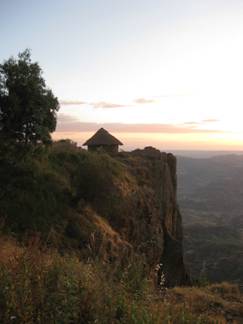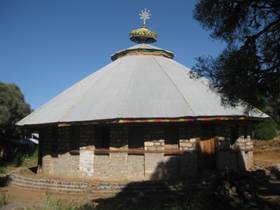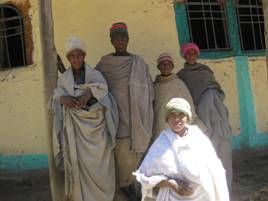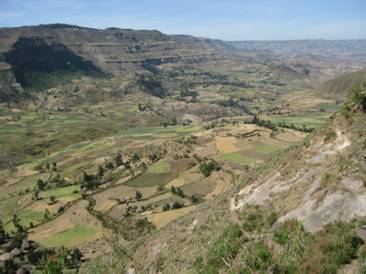Africa is Rich
…as well as Poor. I don’t dispute, and I do care very much about changing, the well known material and health deprivation in Africa. But Life doesn’t have only one dimension.

These thoughts were prompted by a recent seven-day journey on foot through the highlands of North Wollo, Ethiopia.[1] Going through a district with no roads, no electricity, no wheeled vehicles, no source of energy other than animal and human power, threshing and winnowing grain with Biblical technology, amidst rock-walled villages with tukuls of sticks, mud, and thatch, no signs of “modernity” of any kind, you might think the focus could only be on poverty.
Yet I was struck also by many other things: the centuries-old Ethiopian Orthodox Christianity, with a beautiful church in each village, the coffee ceremony associated with the homeland of coffee, the wonderful cuisine, the tenacious skill and hard work needed to reap a rich harvest of teff, wheat, and barley out of a rocky land, the hospitality of the villagers who invited us to share their homemade beer after church services, and - above all - the dignity of local people proud of their Amhara history and culture, who don’t consider themselves “the poor.”

These experiences were courtesy of a remarkable community tourism NGO called TESFA (Tourism in Ethiopia for Sustainable Future Alternatives).
Some development professionals acted as entrepreneurs with local communities, letting them in on the strange notion that some faranji would be delighted to pay large sums to do the hard work of climbing up and down escarpments. Aid agencies and embassies (Save the Children UK, Irish Aid, Dutch and British Embassies) provided start up capital to build guest camps.

Eschewing the voyeurism of marketing poverty itself (like a few tourism projects criticized on this blog), the villagers gradually realized that they were sitting on a tourism gold mine of spectacular scenery and rich culture. TESFA is now Ethiopian-run, and the emphasis is on local guides and villagers providing all the services to the trekkers who pass through, supplementing their incomes through offering something of great value in the world market for trekking destinations. (Adventure travelers and trekkers everywhere – you can’t miss this. You don’t have to be in great shape either – I wasn’t and was fine.)
Which brings me back to the idea: Africa is Rich, as well as Poor.
 At home, we don’t value people around us only by their numerical income – we also recognize courtesy, classiness, intelligence, loyalty, familial devotion, community dedication, spirituality, peacefulness, creativity, beauty, style, kindness, athleticism, artistry, and many other dimensions.
At home, we don’t value people around us only by their numerical income – we also recognize courtesy, classiness, intelligence, loyalty, familial devotion, community dedication, spirituality, peacefulness, creativity, beauty, style, kindness, athleticism, artistry, and many other dimensions.
So why do we insist on defining Africans only on the dimension in which Africa looks worst – material income – when on some other dimensions Africa compares well to the West? Wouldn’t it be a lot less patronizing if we recognized the riches as well as the poverty of Africa?
[1] (obligatory caveat that generalizations about “Africa” based on one district are silly, but a way to start a conversation)
 From Aid to Equality
From Aid to Equality
